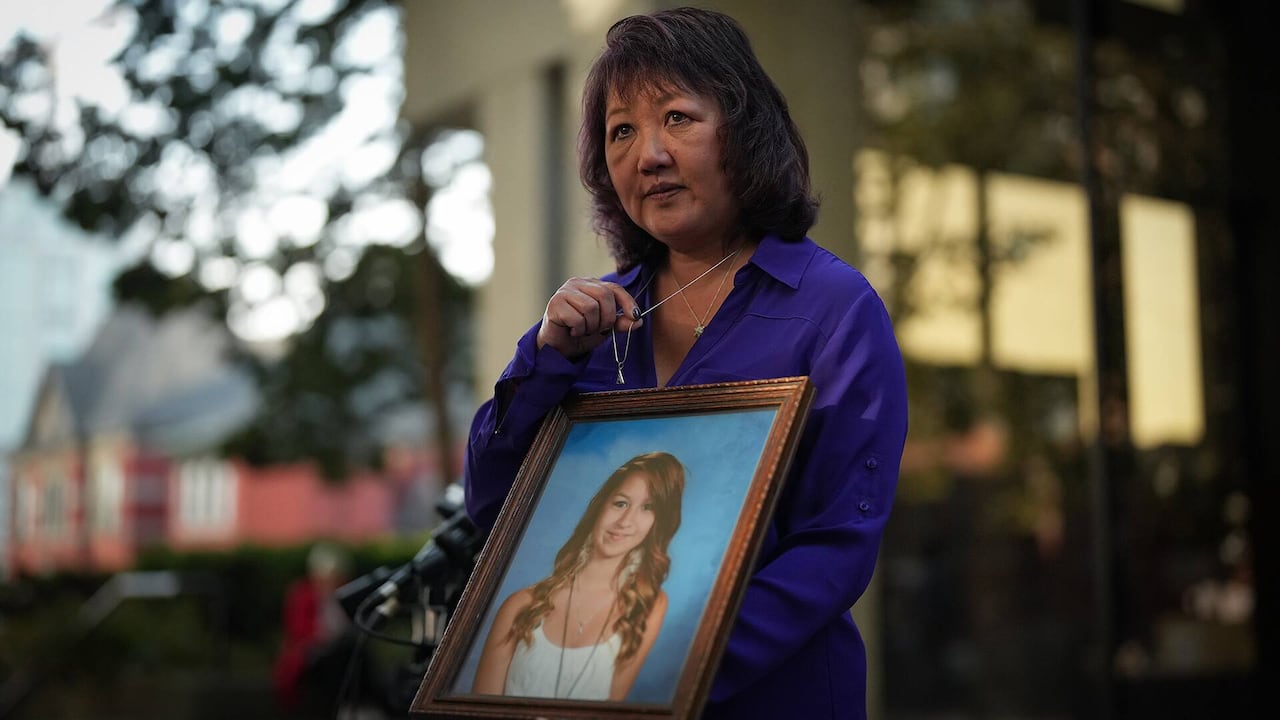Listen to this article
Estimated 5 minutes
The audio version of this article is generated by text-to-speech, a technology based on artificial intelligence.
A national coalition of advocacy groups, health-care organizations and a telecommunications company have come together to demand the federal government reintroduce legislation to protect children from online exploitation.
The coalition held an event in Ottawa on Thursday — marking National Child Day — to announce its demand that legislation be introduced to Parliament before midnight on New Year’s Eve, saying the federal government must act faster to tackle online bullying and abuse.
“Today should be a day of celebration; instead we’re here to sound the alarm,” said Andrea Chrysanthou, chair of the board for Children First Canada, one of the groups in the coalition.
“Across this country children are being exploited, extorted, bullied, manipulated and exposed to dangers that no child should ever face,” she said. “We’ve waited years for action. In that time, too many kids have been hurt, too many families shattered, and so many preventable tragedies have occurred.”
The coalition also includes Telus, children’s hospitals, like Sick Kids and CHEO, and other child advocacy organizations, such as the Child & Youth Advocacy Centres of Canada and the Amanda Todd Legacy Society.
“Protecting children online isn’t a ‘nice-to-have.’ It’s who we choose to be as a country,” said Dr. Margot Burnell, president of the Canadian Medical Association, another member, in a statement.
“This is how we build a Canada worthy of their future.”
Andrea Chrysanthou, chair of the board for Children First Canada, launched the Countdown for Kids campaign on Thursday, part of a coalition calling on the Liberal government to reintroduce online harms legislation before the end of 2025. At a news conference in Ottawa, Chrysanthou said: ‘We’ve waited years for action.’
In June 2021, the federal government introduced Bill C-36, online harms legislation meant to crack down on hate propaganda, hate crimes and hate speech. But when a federal election was called two months later, C-36 died on the order paper, without ever having gone to committee for debate.
The Liberal platform that year pledged to introduce new online harms legislation within the first 100 days of re-election. But it took until February of last year for the Liberal government to introduce its next version of that legislation, Bill C-63, the Online Harms Act.
The legislation was written to tackle content that bullies children or encourages self-harm, as well as content that sexualizes children and sexual content posted without consent. It also addressed hate speech more broadly, as well as content that incites violence or terrorism.
To address those additional concerns, Bill C-63 included Criminal Code and Canadian Human Rights Act amendments, targeting hate in the same legislation. But critics said some of those provisions risked compromising free speech.
Then the Liberal government announced last December that it would be splitting C-63 into two parts, with one part dealing with the protection of children and the other tackling hate speech and inciting violence.
None of that happened before this spring’s federal election was called; once again, the bill died on the order paper.
A 40-day campaign
The coalition said Thursday it is launching a 40-day campaign — called the Countdown for Kids —to pressure the Liberal government to retable the legislation before the year ends, pushing to rename the forthcoming legislation the “Online Safety Act.”
While it’s not perfect, the coalition says, legislation to protect children is so urgently needed that C-63 should be introduced now, then improved with amendments over time.
The coalition’s campaign features a clock that will countdown to midnight on New Year’s Eve in an effort to convey the urgency it says is required to tackle the ongoing threat to children.
Watch | Amanda Todd’s mother says new online harms bill ‘could have saved her life’:

It says it wants the bill to contain two key “non-negotiable” elements.
The first is for the legislation to create an independent regulator with the authority to force online platforms to comply with the law and to have the power to issue fines when the act is violated.
The second demand is to impose a “binding duty of care” on digital platforms to “prevent and respond to online harms against children.”
“We’re calling on every member of Parliament and every senator across all party lines to treat this as the national emergency that it is. We need to get this done,” said Chrysanthou.
The coalition points to recent statistics showing the rising number of instances of online child sexual exploitation that have been reported to police as evidence the government needs to move faster.
According to Statistics Canada, 19,516 online child sexual exploitation incidents were reported by police in 2023 — a 59 per cent increase from the rate reported by police in 2022.
The coalition also says instances of cyberbullying have reached an alarming level, with 31 per cent of Canadian youths saying they’ve been cyberbullied.
In June, Justice Minister Sean Fraser told The Canadian Press that the federal government hasn’t decided whether to rewrite or simply reintroduce the Online Harms Act introduced in 2024.
In their spring election platform, the Liberals promised to make the distribution of non-consensual sexual deepfakes a criminal offence.
They also pledged to introduce a bill to protect children from online sexploitation and extortion, and to give law enforcement and prosecutors additional tools to pursue those crimes.







